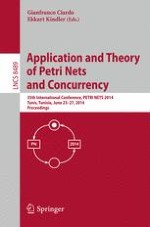2014 | OriginalPaper | Buchkapitel
Analysis of Petri Net Models through Stochastic Differential Equations
verfasst von : Marco Beccuti, Enrico Bibbona, Andras Horvath, Roberta Sirovich, Alessio Angius, Gianfranco Balbo
Erschienen in: Application and Theory of Petri Nets and Concurrency
Verlag: Springer International Publishing
Aktivieren Sie unsere intelligente Suche, um passende Fachinhalte oder Patente zu finden.
Wählen Sie Textabschnitte aus um mit Künstlicher Intelligenz passenden Patente zu finden. powered by
Markieren Sie Textabschnitte, um KI-gestützt weitere passende Inhalte zu finden. powered by
It is well known, mainly because of the work of Kurtz, that density dependent Markov chains can be approximated by sets of ordinary differential equations (ODEs) when their indexing parameter grows very large. This approximation cannot capture the stochastic nature of the process and, consequently, it can provide an erroneous view of the behavior of the Markov chain if the indexing parameter is not sufficiently high. Important phenomena that cannot be revealed include non-negligible variance and bi-modal population distributions. A less-known approximation proposed by Kurtz applies stochastic differential equations (SDEs) and provides information about the stochastic nature of the process.
In this paper we apply and extend this diffusion approximation to study stochastic Petri nets. We identify a class of nets whose underlying stochastic process is a density dependent Markov chain whose indexing parameter is a multiplicative constant which identifies the population level expressed by the initial marking and we provide means to automatically construct the associated set of SDEs. Since the diffusion approximation of Kurtz considers the process only up to the time when it first exits an open interval, we extend the approximation by a machinery that mimics the behavior of the Markov chain at the boundary and allows thus to apply the approach to a wider set of problems. The resulting process is of the jump-diffusion type. We illustrate by examples that the jump-diffusion approximation which extends to bounded domains can be much more informative than that based on ODEs as it can provide accurate quantity distributions even when they are multi-modal and even for relatively small population levels. Moreover, we show that the method is faster than simulating the original Markov chain.
